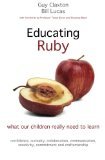Five words from the blurb: schools, progressive, change, children, confidence
I’m currently trying to decide which secondary school to send my children to, so I bought a copy of this book in the hope it might give me an idea of what to look for when I’m visiting them. It proved excellent for this purpose, but was also good at pointing out what parents can do to help their children within the home.
Educating Ruby states that our current education system fails to teach children what they really need to know to thrive in the outside world. It’s current focus on passing exams means that children falter when confronted with the skills needed for employment. The book argues that the education system needs to change radically in order to teach children to work with others, to communicate effectively, and to have the confidence needed to chase their dreams. It also questions the topics that should be taught in schools – suggesting that learning about finance, cookery and sex might be of more use than trigonometry or the Tudors.
Some parts of this book felt like an uncontrolled rant but beneath the surface it contained a lot of interesting points. It made suggestions for how to improve a child’s social skills, both as a parent and as a professional within the school environment, and gave numerous examples of how to make lessons more interesting and engage children in creative thought:
A few years ago we worked with a teacher in a school in Milton Keynes who undertook some research into ways of making reading and writing fun for her Year 1 children in ‘Elephants’ class. The teacher chose Green Eggs and Ham by Dr Seuss as a book to read together (a good choice given its central character is Sam-I-Am who is reluctant to try things out but gradually learns to ‘give it a go’). She equipped the Elephants with paper, pencils and clipboards and asked where they’d like to do their writing. They chose to try in the classroom with the lights off and powered by torches, in the staffroom (achieved after a bit of negotiation!), lying on the floor in the school library, in the school grounds and even in the local park. This simple but imaginative approach worked well. Accompanied by the normal phonics and handwriting practice, the confidence of the Elephant class increased, the teacher told us, as did the fluency and skill of their writing.
It became increasingly useful as it neared the end – especially because it backed up many of its proposals with scientific research or examples for further reading.
Educating Ruby makes a compelling case for changing the way children are taught in schools. I hope that the ideas discussed within this book can be introduced into schools and more people come to appreciate that exam success is not the most important thing a child can achieve.

.

